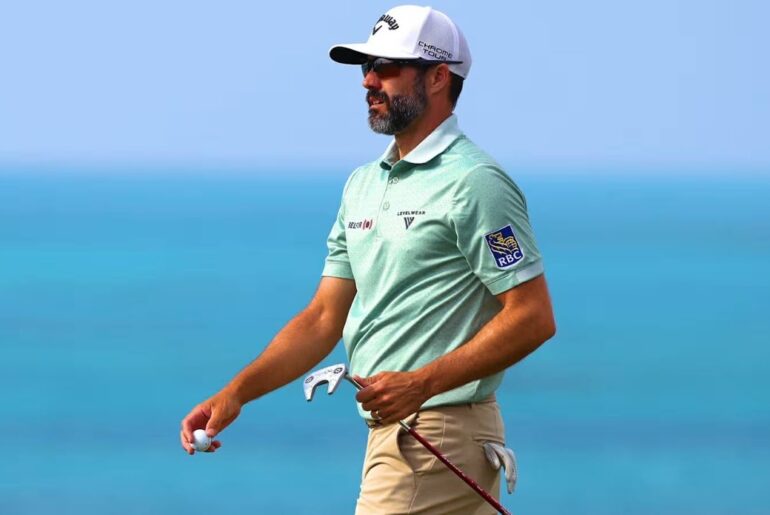00:00 – Lee Westwood Slams Official World Golf Ranking After Massive 3,759 Spot Jump
03:56 – Lee Westwood Slams OWGR: Is the LIV Golf Rankings System a Mockery?
06:40 – Jon Rahm and Lee Westwood Criticize OWGR System Ahead of Ryder Cup
1. Lee Westwood Slams Official World Golf Ranking After Massive 3,759 Spot Jump
Golf veteran Lee Westwood blasts the Official World Golf Ranking system after
jumping an astonishing 3,759 spots to No. 930 following his top 40 finish at
The Open Championship. Westwood, who plays on the LIV Golf tour, criticizes the
system for not awarding world ranking points to LIV Golf events, affecting his
and fellow players’ standings. Discover how this impacts major championships
and the future of golf rankings.
Key Points:
– Lee Westwood’s significant ranking jump
– Criticism of the Official World Golf Ranking system
– LIV Golf’s quest for world ranking points
– Impact on major golf championships
2. Lee Westwood Slams OWGR: Is the LIV Golf Rankings System a Mockery?
LIV Golf · Lee Westwood · Official World Golf Ranking
Join us as we break down Lee Westwood’s fiery critique of the OWGR system and what it means for LIV Golf players:
– Why Westwood vaulted 3,759 spots after The Open tie
– The impact on Dustin Johnson, Bryson DeChambeau & Tyrrell Hatton
– OWGR accreditation struggles and future major championship qualifications
– Jon Rahm’s strokes-gained proposal vs. traditional points
– How majors might adapt to include top LIV talent
Subscribe for in-depth analysis, pro insights, and the latest updates on the LIV Golf vs. OWGR debate!
3. Jon Rahm and Lee Westwood Criticize OWGR System Ahead of Ryder Cup
As the Ryder Cup approaches, top golfers Jon Rahm and Lee Westwood have publicly criticized the Official World Golf Ranking (OWGR) system for excluding LIV Golf pros from earning ranking points. This has created a contentious debate, especially as the deadline for automatic Ryder Cup qualification looms. In this video, we delve into the controversy surrounding the OWGR, featuring sound bites from Westwood and Rahm, and explore how this could impact the Ryder Cup rosters. With key players like Westwood and Rahm voicing concerns, the integrity and fairness of the ranking system are being questioned. This discussion is crucial for golf fans who want to understand the implications for the Ryder Cup and the future of golf’s ranking system.
Tags: #OWGR #RyderCup #GolfControversy #LIVGolf #GolfRankings #Sports #Golf #JonRahm #LeeWestwood
Lee Westwood slams official World Golf ranking after massive 3,759 spot jump. Is the official World Golf ranking system truly fair or is it fundamentally flawed? That’s the burning question after Lee Westwood’s jaw-dropping leap of 3,759 places following his performance at the Open Championship. But here’s where things get really interesting and controversial. Westwood’s meteoric rise in the rankings has reignited a heated debate about how the OWGR treats players from the LiveG golf tour. After tying for 34th at Royal Port Rush, Westwood now finds himself ranked 930th in the world. While that might not sound like a headline, it’s a massive jump that puts him ahead of his own son Sam, who is currently 2759th and competing on a mini tour. And this is the part most people miss. Westwood’s new ranking isn’t just a personal milestone. It’s a glaring example of what he sees as a broken system. I think that just proves that without world ranking points, it makes a bit of a mockery of the system, Westwood remarked during the Livg golf event in the UK as reported by ESPN. His frustration is shared by many fellow LIV golf players who argue that their tournaments deserve recognition from the OWGR. Yet, despite repeated applications, the league’s request for accreditation remains under review, leaving its players in limbo. Let’s break this down for those new to the debate. The OWGR is the global standard for ranking professional golfers, and it plays a crucial role in determining who qualifies for major championships. However, since LIIV BOL launched in 2022, its events have not been awarded ranking quits. This means that unless LIIV players compete in major tournaments or on other international tours, their world rankings inevitably suffer. Take Dustin Johnson as a prime example. Once the world’s top ranked golfer for an astonishing 135 weeks, Johnson now sits at 571st. His only recent boost coming from a tied 23rd finish at the Open. The message is clear. No matter how well LIIV players perform within their own league, the OWGR doesn’t reflect their achievements. And here’s a point that’s sure to spark debate. Only Bryson Dshambo, 16th, and Tier Hatton, 21st, are currently in the OGR’s top 50 among live players. Big names like John Ron and Patrick Reed, despite their impressive play, are nowhere near the upper ranks. Is this a fair representation of the world’s best golfers or is the system excluding top talent simply because of where they choose to play? Westwood believes the issue goes beyond personal rankings. It’s about wanting the best players in the major championships, he explained, emphasizing that the current system risks leaving out a deserving competitors. He’s encouraged by LIIV Golf’s renewed push for OWGR recognition, hoping it will open doors for more players to qualify for the sport’s most prestigious events. Furiel Hatton has also spoken out, stressing the importance of creating a fair pathway for LIIV golfers to participate in majors. There are a lot of guys out here who should be playing in majors. If there’s a better way for us to get there, that’s fantastic, Hatton said. But here’s the controversial twist. Should the OWGR adapt to include LIIV golf events? Or is it right to maintain its current standards? Does the exclusion of LIIV players protect the integrity of traditional tours, or does it undermine the goal of showcasing the world’s best talent? Now, it’s your turn to weigh in. Do you think the OWGR is outdated and in need of reform, or is it justified in its approach? Should LIIV golf events count toward world rankings, or would that dilute the value of the system? Share your thoughts and join the conversation. This is a debate that’s far from settled. Lee Westwood slams OWGr. Is the live golf ranking system a mockery? In a recent development that has sparked controversy in the golfing world, Lee Westwood, a prominent LIIV golf player, has criticized the official world golf ranking OWGR system, labeling it as a mockery. Westwood’s comments came after his tie for 34th at the Open Championship propelled him an astonishing 3,759 spots in the OGR, placing him at no 930. This leap was enough to surpass his son Sam, a mini tour player currently ranked 2759th, providing Westwood with a prime example of the systems flaws. Westwood’s criticism is not an isolated incident. The LIV Golf League, of which Westwood is a part, has been grappling with the OWGR system since its inception. The league, which includes high-profile players like Dustin Johnson and Bryson Dshambo, has been denied OWGR accreditation since its launch in 2022. This lack of recognition has resulted in a significant drop in rankings for Liv players with Johnson, a former number one, dropping as low as 97th. The current top 50 of the OGR includes only two Liv players, Bryson Dshambo and Tierrell Hatton. Westwood, however, remains optimistic about Liv’s recent reapplication for OWGr accreditation, which is currently under review. He believes that without OWGR recognition, the four major championships will need to revise their qualification processes to include more LIIV players. Westwood’s concerns are echoed by John Rom, who has been vocal about the flaws in the OWGR system, even before joining LIV in December 2023. Rom supports a system that focuses more on key playing metrics such as strokes gained, which he believes provides a more accurate reflection of a player’s performance. The issue at hand is not just about rankings, but also about the future of golf. Without OWGR recognition, it will become increasingly difficult for LIV players to qualify for the four major tournaments each year. LIIV Golf CEO Scott O’Neal has expressed hope that the approval process can progress ahead of the 2026 major season. The controversy surrounding the OGR system raises important questions about the future of golf. Should the system be revised to better reflect a player’s performance? or should the major championships revise their qualification processes to include more LIIV players? These are questions that the golfing world will need to grapple with in the coming years. John Rom and Lee Westwood criticize OWGr system ahead of Ryder Cup. Golf’s ranking system is at the center of a growing storm and some of the sport’s biggest names are calling for a shakeup. With the RDER Cup just weeks away and LIIV golf players locked out of the official World Golf Ranking, OWGR, the debate over fairness, opportunity, and the future of the game has never been louder. But here’s where it gets controversial. What if the current system is not just flawed, but actively excluding top talent from the biggest events? Let’s break it down. Lee Westwood, a veteran English golfer once among the world’s elite, now sits at a staggering number 930 in the OWGR. Yet, after finishing tied for 34th at the Open, he leaped 3,759 spots, surpassing his son Sam, who plays on a minor tour. When asked about the absurdity of it at a live golf press conference, Westwood called the situation a mockery. How? Because live players aren’t awarded OWGR points for their own tournaments. Meanwhile, players on the PGA and DP World Tours earn points for every event they compete in. This creates a glaring imbalance, leaving live pros like Westwood and Dustin Johnson, who dropped to number 907 before rebounding to number 571 at the Open, struggling to climb the rankings. And this is the part most people miss. The OWGR isn’t just a list. It’s the backbone of qualification for majors and team events like the RDER Cup. John Rom, who joined Liv in December 2023, has been vocal about the systems flaws for years. He argues that the 2-year rolling points model unfairly penalizes short-term slumps and reward strategic scheduling. You can finesse the system by picking and choosing events, he said. Rohm also praised Stroke’s game metrics as a more accurate reflection of performance, suggesting the current point system is crazy in its rigidity. Terrell Hatton, who finished T16 at the Oven, echoed similar frustrations. He pointed out that many players rankings don’t reflect their true abilities, especially in a landscape where LIIV golfers are excluded. The sooner the rankings become realistic again, the better for golf, he said. But here’s the rub. What if the solution isn’t fixing the OWGR, but overhauling the entire qualification process? Westwood hinted at this, arguing that either live players need ranking points, or the majors must create a separate system. Some seem to want it, but others are reluctant, he noted. Could this split the sport further? As Live Golf UK tees off this Friday and the RDER Cup countdown continues, the pressure is mounting. Will the PGA Tour and governing bodies finally address the growing divide? Or will we see a fractured system where talent is sidelined simply because they play in the wrong league? We’d love to hear your take. Is it time to overhaul the OWGR, or does the current structure still serve the game’s best interests? Drop your thoughts in the comments below. Let’s spark a conversation the golf world can’t ignore.







